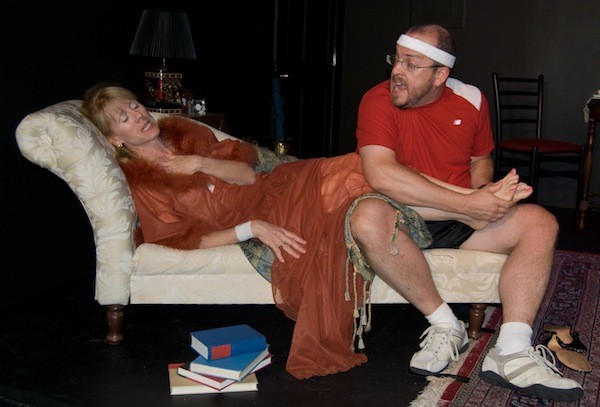After establishing himself as an enfant terrible on the New York theater scene with such risqué parodies as Vampire Lesbians of Sodom and Psycho Beach Party, it's ironic that Charles Busch's most vicious attack on the pomposity and smug pretentiousness of New Yorkers, The Tale of the Allergist's Wife, was the first work by the subversive playwright to be presented on the mainstream Broadway stage — and the only one to thrive there. Along with the broad sexual comedy we expect from Busch, toned down for the tourists, there is considerable subtlety lurking in the script.

That's what you don't expect and can easily miss. By casting Tony Roberts as the allergist in the original Broadway production, director Lynne Meadow certainly hoped to let us in on the secret that Busch was targeting the same kind of serene, superficial, pseudo-sophisticated, blandly successful guy that Roberts had played again and again in Woody Allen's films for over 25 years. With all the bawdy comedy and ethnic humor that Busch was dishing out, it was easy enough for New Yorkers to miss, overlook or ignore the darts and daggers that were being hurled in their direction amid the hilarity.
Or if you were a New York expatriate like me, you reveled in even the smallest of those darts.
Up in Cornelius, director Jim Esposito brings an intriguing perspective to the current production at the Warehouse Performing Arts Center, having introduced the role of Dr. Ira Taub in the Metrolina premiere of Allergist at Actor's Theatre of Charlotte in 2005. Espo was so pathologically cuddly that he seemed constitutionally incapable of delivering the allergist's maddening conceit and complacency. But in casting the Warehouse effort, he brings us the far more simpatico Philip Robertson as Ira.
Dr. Taub is not only adept at tedious discourse on the bronchia, he is a minor celebrity, asked to do guest lectures at NYU as well as guest shots on WBAI, the city's most toney FM station. His neglected, self-pitying wife Marjorie is deeply depressed, doubly so because her dear therapist Reba has died.
Emerging from this malaise will be doubly difficult, even after the sudden appearance of her old-time childhood friend, Lee Green (nee Lillian Greenblatt). As we soon discover, Marjorie's mother Frieda diligently discourages every spark of initiative that emerges from her daughter. When she's not doing that, she's disgusting the household with her graphic descriptions of her colonic ailments and emissions, repeatedly calling on Dr. Kavorkian to come and end her tsuris.
For a while, Lee is able to sweep aside all before her, both Marj's self-dramatized blues and Frieda's constipated complaining. She personifies the open-mindedness that Ira merely professes, living and devouring life instead of posing at it, with a wealth of travels, connections, experiences and anecdotes that Ira and Marj can only drool over. So Lee must be too good to be true, right? Of course right, especially after a night of unprecedented sexual abandon.
Watching all this unfold in Cornelius, where nobody else in the audience knows the difference between a sheitel and a shmatte, can be a little surreal. Compound that with a cast that gets more than half of the Yiddish vowel sounds wrong, and I occasionally felt like I'd plunged into an alternate universe. Esposito and The Warehouse need to invest in a copy of The Joys of Yiddish before the words sheitel or golem are uttered on Westmoreland Road again. Apparently, at this far remove from the Big Apple, even the simple, soulful oy is imperiled.
The urbane and assimilated Ira is mostly exempt from the family's paroxysms of Yiddish, so Robertson isn't implicated in the evening's off-flavorings, but his Ira could use a little more coolness to achieve his full impersonal distance from his wife. A true storefront space, the wee Warehouse stage does make it difficult to radiate elegance or opulence and abridges the scope for remoteness, but I can't accuse Robertson of compensating.
Dressed in luxuriant loungewear when we first see her, as opposed to Ira's jogging suit, Cat Rutledge has an easier path to establishing Lee's bourgeois neuroses, and she does it with the right sprinkling of grandiloquence. It's those Jewish patches where we find her stumbling. Wearing a fairly bedraggled sheitel — it's a wig, folks — Becky Porter has the toughest schlep as Frieda, who is, after all, the archetypal Jewish mother-in-law from hell, still kicking hard at 80. She isn't altogether terrible, but this is far from her best work. You need to have your lines and your words.
Except for that wig thang, costumes by Lory Butters are all impeccable, particularly in alerting us to the possibility that Lee is a sexual predator. That's a good direction to take the script when Marla Brown, like Porter, is at least a decade too young for her role. In fact, the bravura of Brown's performance — her casual name-dropping, her cat-like aggressiveness — partly turns the contrast between Lee and Ira on its head, for I often found Lee's impossibly rich and eventful Zelig-like past more believable than Ira's mundane celebrity.
It's a remarkable performance in a remarkable comedy, pulsating with vitality and the intoxicating perfume of danger. Jostled it may be, but Busch's wickedness is still well worth the trip up I-77 to Exit 25. Come early with a copy of The Joys of Yiddish, and it could be even better than it was last week.